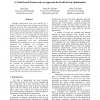Free Online Productivity Tools
i2Speak
i2Symbol
i2OCR
iTex2Img
iWeb2Print
iWeb2Shot
i2Type
iPdf2Split
iPdf2Merge
i2Bopomofo
i2Arabic
i2Style
i2Image
i2PDF
iLatex2Rtf
Sci2ools
117
click to vote
CGO
2005
IEEE
2005
IEEE
Model-Based Framework: An Approach for Profit-Driven Optimization
Although optimizations have been applied for a number of years to improve the performance of software, problems that have been long-standing remain, which include knowing what optimizations to apply and how to apply them. To systematically tackle these problems, we need to understand the properties of optimizations. In our current research, we are investigating the profitability property, which is useful for determining the benefit of applying an optimization. Due to the high cost of applying optimizations and then experimentally evaluating their profitability, we use an analytic model framework for predicting the profitability of optimizations. In this paper, we target scalar optimizations, and in particular, describe framework instances for Partial Redundancy Elimination (PRE) and Loop Invariant Code Motion (LICM). We implemented the framework for both optimizations and compare profitdriven PRE and LICM with a heuristic-driven approach. Our experiments demonstrate that a model-based...
CGO 2005 | Model-based Approach | Profitability Property | Scalar Optimizations | Software Engineering |
Related Content
| Added | 24 Jun 2010 |
| Updated | 24 Jun 2010 |
| Type | Conference |
| Year | 2005 |
| Where | CGO |
| Authors | Min Zhao, Bruce R. Childers, Mary Lou Soffa |
Comments (0)

